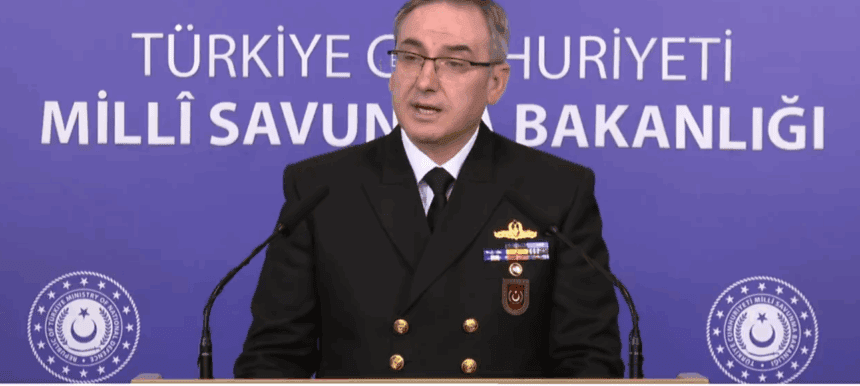Turkey’s Defense Ministry on Thursday dismissed as “baseless” and “inaccurate” reports that an Israeli airstrike in Syria hit Turkish military assets, following a weekly briefing in Ankara by spokesperson Rear Adm. Zeki Aktürk. The ministry reiterated that there is “no adverse situation” affecting Turkish troops or equipment in Syria and warned that disinformation—especially on social media—was stoking tensions. It also criticized Israel’s cross-border operations, including this week’s strike in Doha, calling them violations of sovereignty and international law.
The denial came after Saudi broadcasters Al-Hadath and Al Arabiya cited an unnamed Israeli security source claiming that a recent strike around the Syrian city of Homs targeted depots storing Turkish-made missiles and air-defense gear, and that Israel remains in contact with Syria’s new leadership on security arrangements “while using force when necessary.” Israeli and regional outlets echoed the claim, asserting the munitions were manufactured in Türkiye and moved into Homs shortly before the strike. Israel did not formally comment on that specific raid, though the IDF chief later appeared to hint at Israeli responsibility for strikes in Syria earlier in the week.
Syrian state-affiliated media and regional outlets reported that Israel struck multiple locations around Homs, Latakia and the Palmyra area on September 8–9. Damascus condemned the attacks as a “blatant violation” of sovereignty. Israel has conducted hundreds of strikes in Syria over the years to prevent what it calls hostile force build-ups on its northern frontier; in 2025 it has focused on runways, depots and air-defense nodes it views as red lines.
The Turkish ministry’s line Thursday was consistent with earlier briefings, in which Aktürk said Turkish personnel in Syria had suffered no setbacks from Israeli actions and urged a halt to “destabilizing” strikes. Ankara has increasingly aligned itself with Syria’s interim authorities since the collapse of the Assad regime in December 2024, moving to shape security along its southern border while positioning itself as a guarantor of Syrian territorial integrity.
Reporting over recent months has detailed a pattern of Israeli attacks on Syrian air facilities—including Hama’s military airport and the T-4 base near Homs—amid allegations that Turkish teams had inspected or scoped some of those airfields. Israel has framed such sites as enabling a post-war military build-up it intends to deter; Turkish and Syrian sources have countered that site visits were part of discussions over base rehabilitation and broader defense cooperation. Ankara and Tel Aviv have simultaneously explored deconfliction channels to avoid incidents even as rhetoric has hardened.
This week’s exchange unfolded amid a sharp escalation after an Israeli airstrike in Doha targeting Hamas figures. Qatar, the United States and European governments condemned the strike; Israel’s leadership defended it, and a senior Israeli official vowed to pursue Hamas leaders “everywhere.” Gulf equity markets also fell on the news. Hamas said the attack would not change its ceasefire demands in Gaza.
The Doha fallout has widened quickly. Qatar called the strike a “blatant” breach of sovereignty and warned it jeopardizes mediation, while Prime Minister Mohammed bin Abdulrahman Al-Thani said the attack “killed any hope” for a hostage deal. Washington signaled displeasure—President Trump said he was “very unhappy”—even as Israel’s ambassador in Washington vowed that if top Hamas figures survived, Israel would “succeed next time.” Russia denounced the raid as a “gross violation” of the UN Charter, and Saudi Arabia, the UAE and the EU issued condemnations. Families of Israeli hostages voiced “grave fear” that the Doha strike could derail a ceasefire-for-hostages arrangement; Hamas said its negotiating stance remains unchanged.
Regionally, Qatar has weighed convening emergency Arab consultations while pursuing UN avenues, even as it stresses its role as a U.S.-backed mediator. Markets treated the shock as contained: Gulf equities were mixed, Qatar’s index wobbling around flat-to-lower levels, and there were brief haven moves in oil and gold. Analysts noted the additional risk of friction around Al Udeid Air Base, the main U.S. hub in the Gulf, if tit-for-tat actions continue.



